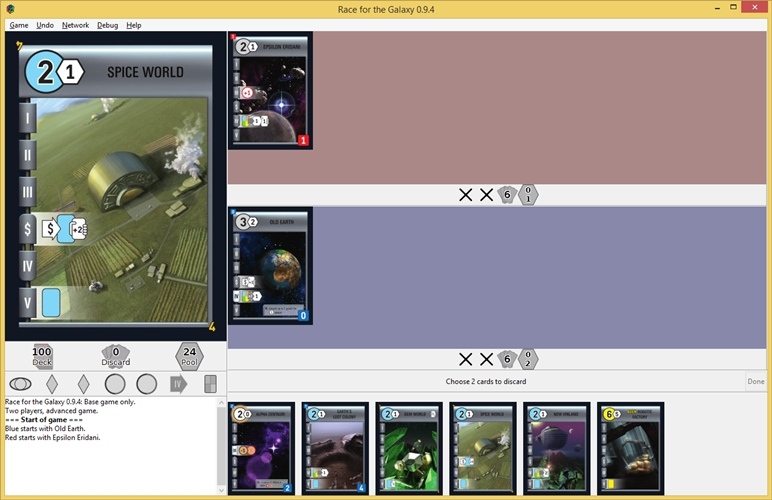Race for the Galaxy AI0.9.4
A galaxy of cards
Sometimes, you can achieve a lot using only little. Well, the physical game that I'm writing about does just that. Not needing any fancy components or baroque rule sets, Race for the Galaxy is one of the most appreciated card games in existence today (if you don't count classics like Poker, Bridge and the like). During the game each player will create a tableau, a unique engine that fuels space exploration, space expansion, space conquest, technological and civic achievements, all in the effort to generate victory points.
Briefing
Race for the Galaxy is a card game developed by Tom Lehmann. It consists of a huge deck of cards that represent everything from Investment Credits to Pan-Galactic Leagues. Each card has one ore more special abilities that can create momentum if they are used in a good conjunction with others. Race is all about card synergy. While most cards are unique, each game will present different challenges and opportunities to solving this problem. You might focus on a strong economy, a powerful military presence, deep exploration or some other specialization. From the constant stream of cards, picking the right ones is a matter of experience but also experimentation.

Primarily, each card has a cost (number in circle/diamond) and a point value (number in small hexagon). You pay their playing cost by discarding other cards from your hand. Basically, each card that you hold represents a tendency, a possibility that your space civilization can chose to increase its wealth and efficiency. Discarding cards to play others is a way of simulating the shift in focus and resources. This flexible nature feels brilliant but it can also be agonizing. Having a lot of exceptionally good cards means that playing any of them will require that you let go of the rest. A painful exercise, but one that will reward you with countless different approaches to galactic development.
To build a clearer picture of what I'm babbling about, here's how a game round works. There are 5 phases which are executed in the following order (more or less):
Explore - Draw a number of cards and keep some.
More often than not you will want to search for specific cards to add into your tableau, or just as currency.
Develop - Play a development card
Developments generally boost your actions for different phases. Cheaper developments are not unique so they are more common.
Settle - Play a world card
Worlds are a bit more valuable than developments since they can produce goods which can then be spent for cards or points. They are also all unique.
Produce - Worlds produce goods
Each production world in your tableau will receive a face down card from the deck to represent the planet's good.
Consume - Change goods into points and/or cards
Some worlds and developments have consume abilities which are used to convert existing goods into points and/or cards. Although "Consume" is a natural follow-up to "Produce", this phase is resolved before "Produce", making it important to plan this cycle one round in advance.
At the beginning of every round players will secretly select a phase that they want to occur (or two, in a two player advanced game). So not every phase will take place, but only those that players command. Herein lies the crux of player interactivity in RftG. You want to do a lot, but you are limited to what is selected. Since you can only chose for one of the phases, you will need to pay close attention to what other players are doing and deduce what phases they would want triggered. This way you can piggyback on their choice while also choosing a phase that you might profit from more than others.
The game will end either when a player has placed his twelfth card or when the victory point pool has run out. Then each will count his score, shuffle the cards and play again!

This app
Thanks to a fine bloke by the name of Keldon Jones, Race for the Galaxy can also be played on your computer free of charge. The program has a very competent AI that is perfect as an opponent (it kicks butt) and very useful if you also want to learn the rules by playing.
Of course, having played the physical game (a thing that I wholeheartedly recommend) will make it easier to accommodate with the interface; but reading the rulebook will also make it pretty clear since the wording and iconography are the same.
Speaking of iconography. Some criticize RftG by saying that the icons are too complex for new players, but I very much disagree. For once, the basic icons are very easy to read and the more complex ones are accompanied by text on the same card. So once you have read what each basic icon means, then you'll have no problem reading cards from then on.
The interface uses only mouse clicks to mark cards to keep or discard, or to select abilities from a combo box when consuming goods. It is very easy.
When starting a new game, you may chose to play with the base game or include several expansions. The expansions bring not only cards, but new abilities and mechanisms to the game. So it is recommended to stick with the base game to avoid being overwhelmed.
Link to the official rules (PDF)
Conclusion
Race for the Galaxy is a mountain of replay-ability. Although it has a somewhat steep learning curve, you will feel that you are better with each play. There is nothing more satisfying than finally beating the AI opponent...over and over again.